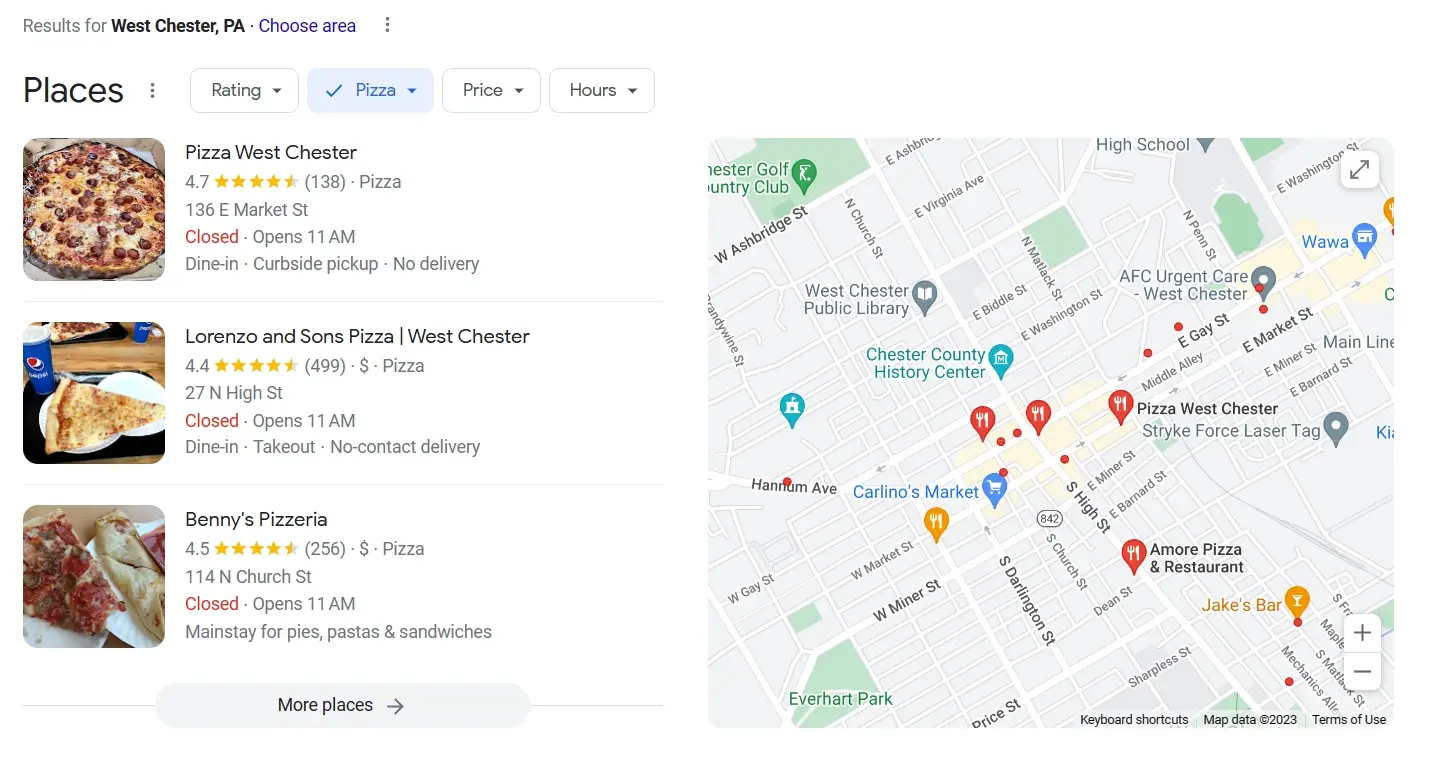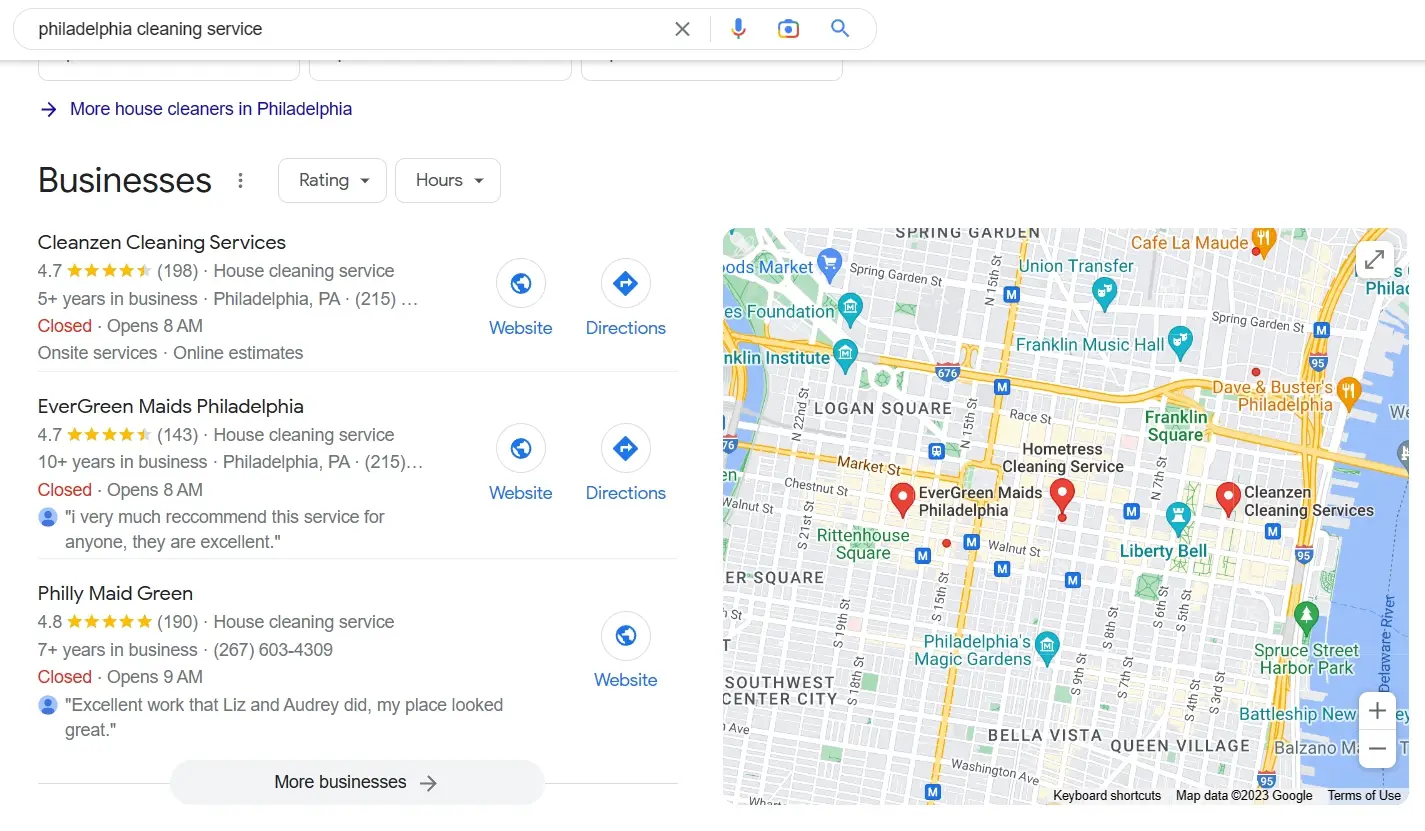- Create a comprehensive Google Business profile
- Ensure your address and phone number on a website are correct
- Add a location page on your website
- Conduct local keyword research
- Create meta tags including local keywords
- Create expert content for locals
- Grow your presence on local forums and communities
- Review local reviews and respond to them in time
- Grow your presence in social media
- Grow your presence in local listings
As a small business owner, you might think that competing with large companies is impossible. However, with local SEO, you can increase your online visibility and attract more customers to your business. Local SEO is the process of optimizing your website and online presence to rank higher in search engine results pages (SERPs) for specific keywords related to your business in your local area. By implementing local SEO strategies, you can promote your services to potential customers who are already looking for what you offer.
What is local SEO?
Local SEO is a branch of SEO that focuses on optimizing your online presence to appear in local search results. The search engines use algorithms that are tailored to show users the most relevant results based on their location and search query. Therefore, local SEO is crucial for small businesses that want to target customers in a specific geographic area. Local SEO can be done through various methods, including optimizing your website, creating and claiming your Google My Business profile, and building local citations. Below, we give you some tips on how to conduct local SEO with a minimum of cost and effort.
This is local SEO search results for the local searches such as “pizza in west chester pa” and “Philadelphia cleaner”


1. Create a comprehensive Google Business profile
A complete Google Business profile provides essential information about your business, including your address, phone number, website, hours of operation, and photos. This information helps potential customers trust your business and feel confident in their decision to visit or contact you.
A comprehensive Google Business profile encourages customers to engage with your business. This can include leaving reviews, asking questions, or even booking appointments directly through your profile.
Ensure that your Google business profile, including your business name, hours, services, products, and photos, is fully optimized and the information is detailed and complete.
2. Ensure your address and phone number on a website are correct
Having consistent and accurate business information, across all your online platforms is critical for local search engine optimization. Make sure your address and phone number are correct on your website and other directories. This will help search engines verify your business location and provide accurate information to users.
3. Add a location page on your website
When users search for a specific service in their local area, search engines use various factors to determine the most relevant results to show. Having a location page on your website can help search engines understand the location of your business and the services you offer in that area. This can improve your chances of ranking higher in local search results, which can lead to increased traffic to your website and more customers for your business.
Moreover, adding a location page can also help you establish credibility and trust with potential customers. By providing accurate and complete information about your business, you can show that you are a legitimate local business owner and increase your chances of attracting customers who are looking for your services in your local area.
4. Conduct local keyword research
By analyzing the search terms used by your target audience in local search, you can gain insights into their needs, preferences, and behaviors. This information can help you tailor your content and messaging to better meet their needs, which can improve engagement and conversion rates.
Here are some steps to conduct local keyword research:
- Identify your target audience and location: Start by identifying your target audience and the locations you want to target. For example, if you own a pizza restaurant in New York City, you may want to target keywords like “pizza delivery NYC” or “best pizza places in Manhattan.”
- Use keyword research tools: There are several keyword research tools available, such as Google Keyword Planner, Ahrefs, SEMrush, and Moz. These tools can help you identify relevant keywords, search volume, and competition for your target location.
- Analyze local search results: Look at the search results for your target keywords and location. Identify the top-ranking websites and analyze their content, headings, and meta descriptions to understand how they are targeting the keywords.
- Local SEO strategy implies using location-specific keywords: Incorporate location-specific keywords, such as the city name, neighborhood, or landmarks, into your website content. This will help your website appear in local search results.
- Monitor your results: Keep track of your website rankings and traffic for your target keywords. This will help you measure the effectiveness of your keyword research and make adjustments as needed.
Monitor your competitor’s keywords, as well as local searches. By analyzing the keywords used by your competitors, you can identify opportunities to differentiate your business and stand out in local search results. This can help you gain a competitive advantage and attract more customers.
5. Create meta tags including local keywords
Meta tags are HTML tags that provide information about a webpage to search engines and other web crawlers. They can help improve your website’s local search engine optimization by providing relevant information to search engines.
Here’s how you can create meta tags, including local keywords:
- Start with the title tag: The title tag is one of the most important meta tags. It appears in the search engine results pages (SERPs) and should accurately describe the content of the webpage. Include local keywords in the title tag to help search engines understand the geographical relevance of the webpage. For example, if you have a local business in New York, include “New York” in the title tag.
- Add a meta description: The meta description appears in the SERPs and gives a brief summary of the webpage’s content. It should be 155-160 characters long and should include relevant local keywords. For example, “Visit our New York store for the best selection of local products.”
- Include local keywords in the URL: The URL of the webpage should be short, descriptive, and include local searches. For example, if you have a local business in San Francisco, use a URL like www.example.com/san-francisco-products.
- Use header tags: Header tags (H1, H2, H3, etc.) are used to organize the content on the webpage. Use header tags to highlight important keywords, including local keywords. For example, “Best San Francisco Products” could be used as an H1 tag.
- Use image alt tags: Alt tags are used to describe images on the webpage to search engines. Use local keywords in alt tags to help improve the webpage’s relevance to local search queries. For example, if you have an image of your San Francisco store, use an alt tag like “San Francisco store front.”
6. Create expert content for locals
Creating expert content for locals requires a deep understanding of the audience you are targeting, their interests, and their needs. In the era of AI-made content, when the articles on the SERP top are all the same, exceptional local content being made by experts of local businesses becomes more important than ever. If you can create something unique and valuable, you’ll definitely be on the top of the SERP.
Here are some tips to help you create expert content to show up in local searches:
- Research your audience: Before creating any content, you need to know your audience. Conduct research to understand their interests, needs, and pain points. Use tools like Google Analytics to gather data on the demographics, location, and behavior of your audience.
- Identify gaps in the market: Look for gaps in the market where you can provide value to your audience. Identify topics that your competitors from other local businesses are not covering or not covering in depth, and focus on creating content around these topics.
- Choose the right format: Choose the format that works best for your audience. Some people prefer to read long-form content, while others prefer video or audio content. Make sure you choose the format that works best for your audience.
- Use your expertise: As an expert in your field, you have a unique perspective and insights that can add value to your content. Use your expertise to create informative and insightful content that your audience will find valuable.
- Keep it local: When creating content for a local audience, make sure you use local keywords and focus on topics that are relevant to your local community. This will help your content rank higher in local search results and win the competition against other local businesses.
- Create visually appealing content: Use visuals like images, infographics, and videos to make your content more engaging and visually appealing. This will help keep your audience engaged and interested in your content.
- Keep it up to date: Make sure you keep your content up to date and relevant. This will help ensure that your content remains valuable and informative to your audience.
7. Grow your presence on local forums and communities
Presence on local forums and communities can help you to build local relevance and authority, increase brand awareness, and generate traffic and leads from local customers. By participating in these communities, you can generate local traffic and improve your local search rankings.
Here is how some local SEO efforts can grow your presence on forums and communities and why it’s important for local search optimization strategies:
- Identify relevant forums and communities: Start by researching local forums and communities that are relevant to your business or industry. This will help you find a targeted audience that is more likely to be interested in your content.
- Participate regularly: Participate regularly by posting and commenting on relevant topics. This will help you establish a presence and build relationships with other members.
- Include local keywords: Use them in your posts and comments to help search engines understand that you are a local business. This will help to improve your visibility in local search engine results.
- Share your expertise: Share your expertise by answering questions and providing valuable information. This will help establish you as a trusted authority in your field.
- Use a consistent profile: Use a consistent profile across all forums and communities to build recognition and trust with other members. Make sure your profile includes a link to your website and local contact information.
- Network with other members: Take the time to network with other members and build relationships. This can lead to new opportunities and collaborations, as well as referral traffic to your website.
8. Review local reviews and respond to them in time
Responding to reviews can also help improve your search engine rankings. Search engines use online reviews as a ranking factor in local search results, so having a large number of positive reviews and responding to them can improve your visibility and increase your chances of ranking higher in search results.
Additionally, monitoring and responding to reviews can also provide valuable insights into your business’s strengths and weaknesses. By paying attention to customer feedback, you can identify areas where you can improve and make changes to better meet the needs of your customers.
Online reviews are one of the most important factors that local customers consider when making purchasing decisions, and they can have a significant impact on your business’s success. It is desirable to respond to reviews on the day they are published and to deal with negative comments.
9. Grow your presence in social media
Social media platforms can help you connect with your audience and promote your business. It’s essential to create and optimize your social media profiles on platforms such as Facebook, Twitter, and Instagram. Consistently post relevant content and engage with your followers to build a community around your local business.
10. Grow your presence in local listings
Online directories are websites that list businesses in specific categories and locations, and they can be a powerful tool for increasing your online visibility and attracting more customers to your local business.
To grow your local business presence on online directories, you should start by identifying the most popular local directories in your industry and location. Some popular directories include Yelp, Google My Business, Bing Places for Business, Yellowpages, and Foursquare. You can also use industry-specific directories, such as TripAdvisor for restaurants and hotels or Houzz for home improvement and interior design.
To find relevant directories, conduct competitors analysis and search for the directories where your competitors left the links on their website. It is very likely that you can also can info about your service in those directories. We recommend to use ahrefs tool for this purpose.
Don’t forget to monitor and update your listings on each directory.
You can also ask customers which directories they use to find local businesses like yours.
To sum up
By implementing these strategies and focusing on local SEO, small businesses can compete with larger competitors and attract more local customers. Remember, consistency and persistence are key to success in local SEO, so make sure to monitor your progress regularly and adapt your strategy as needed. With the right approach, local SEO can help small businesses thrive and succeed in the digital age. We hope that our local SEO tips will help you to grow your business online!






